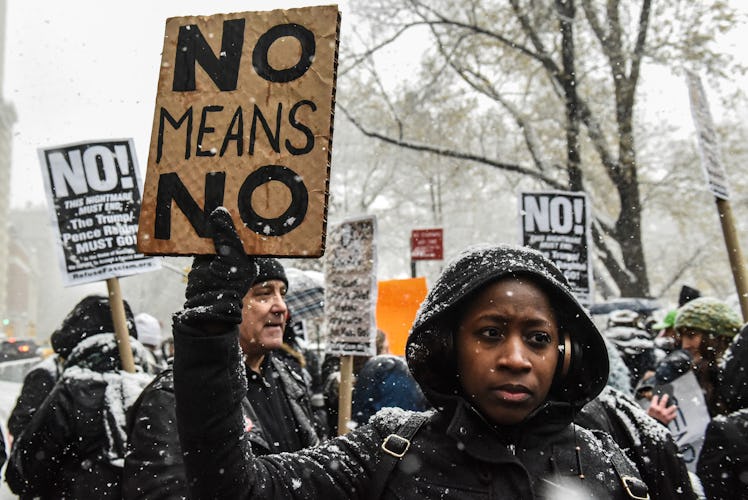
A New Report Is Calling For Major Changes To End Sexual Harassment At Universities
Current practices for handling on-campus sexual harassment cases are in dire need of reform — something that survivors of abuse are acutely aware of. Too often the process for investigating claims is tediously drawn out so as to protect the institution from liability issues, the panel of experts who commissioned a sweeping new report found, and fundamental changes are required in order to put survivors' needs first. A new report on sexual harassment in STEM academia — one of the most comprehensive examinations of its kind — calls for major changes.
The report, which was started before the popularity of the #MeToo movement, was issued by the independent agencies the National Academies of Sciences, Engineering and Medicine. It took more than two years to compile the recommendations for how college campuses should handle sexual assault cases, per The New York Times.
Frazier Benya, program officer with the academies’ Committee on Women in Science, Engineering and Medicine and study director, told Inside Higher Ed that she and her colleagues knew that the scientific community would be watching for the findings of this report. “What we didn’t know," she added, "is that the eyes of the nation would also be upon this study, as a result of so many things that have transpired since." The #MeToo movement has undoubtedly put sexual harassment front and center, but that awareness has not been enough.
“There is no evidence to suggest that current policies, procedures, and approaches have resulted in a significant reduction in sexual harassment,” the report concluded, per The New York Times.
One of the main goals of the report — which outlines 15 detailed recommendations — is to reframe the conversation. Some of the changes the report suggests imply the need for fundamental changes in power dynamics for students and instructors. For example, institutions should overhaul their systems of advisers so that students aren't beholden to one senior researcher for advancement and access to grants.
“The system of meritocracy does not account for the declines in productivity and morale as a result of sexual harassment,” the report found. “It can make her question her own scientific worth. Additionally, it can make scientific achievement feel like it is not worth it.”
The report also urged lawmakers to streamline the process for filing harassment lawsuits so that they could be filed directly against faculty and not just the university. Additionally, the report urged that employees who settle harassment complaints should not be able to keep them confidential from future academic employers.
One of the reasons for the report's urgency, it insists, is that more women are in academia than ever before.
According to the Times, about 58 percent of academic employees have indicated that they had been sexually harassed. The report also cited a 2017 survey by the University of Texas, which found that about 20 percent of female science students, more than 25 percent of female engineering students, and more than 40 percent of female medical students experienced sexual harassment from either faculty or staff members. The report's summary states,
Over thirty years the incidence of sexual harassment in different industries has held steady, yet now more women are in the workforce and in academia, and in the fields of science, engineering, and medicine (as students and faculty) and so more women are experiencing sexual harassment as they work and learn.
The panel that commissioned the report carved out three types of sexual harassment known to occur in academia: sexual coercion, unwanted sexual attention, and gender harassment. It said gender harassment — “verbal and nonverbal behaviors that convey hostility, objectification, exclusion or second-class status” — was the most common type women experienced, according to the Times.
Then, there were the not-so-earth-shattering realizations from the report. It found that male-dominated environments and the organizational climate were the most important factors in determining what causes sexual assault to permeate, per Inside Higher Ed. Aggressors feel much more comfortable in an environment that treats the behavior has commonplace, the report said. Contributing factors are that survivors are unlikely to report harassment formally due to fear of retaliation.
The comprehensive report is likely to be taken very seriously by top STEM universities, per the Times. “Reports from the National Academy carry substantial weight,” Carol Bates, associate dean for faculty affairs at Harvard Medical School, told the Times. The National Academies of Sciences, Engineering and Medicine is well-respected enough and has invested years in the delivery of the report. Hopefully, it will foster meaningful change.